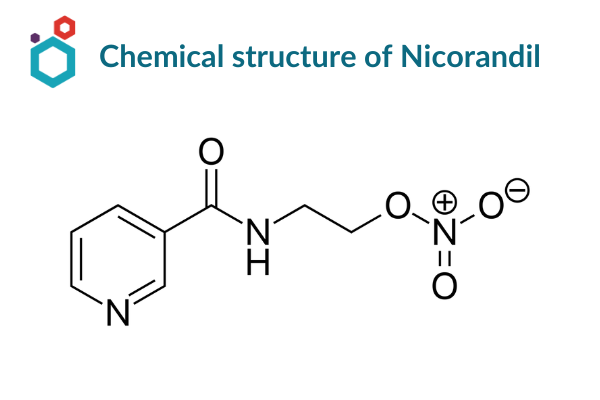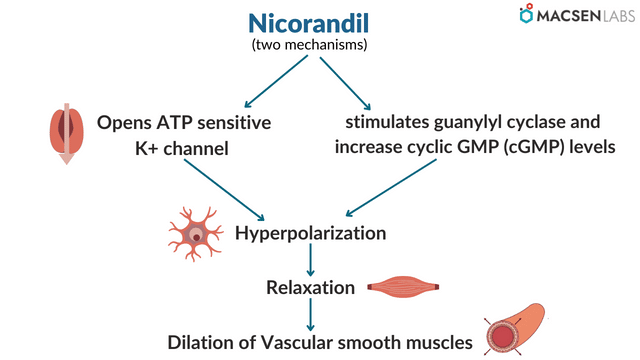Table of Contents
What is Nicorandil
Nicorandil belongs to the class of drugs called vasodilators and is a popular medicine that is used to reduce Angina- chest pain occurring because of the reduced blood flow. The medicine widens the blood vessels and gives space to increase the flow of blood and oxygen to the heart. This medicine is considered the best and usually recommended when other heart medicines are not suitable for you. You will need a doctor’s prescription to procure Nicorandil.
Nicorandil is sold under the brand names Ikorel (in the United Kingdom, Australia and most of Europe), Angedil (in Romania, Poland), Dancor (in Switzerland), Nikoran, PCA (in India), Aprior (in the Philippines), Nitorubin (in Japan), and Sigmart (in Japan, South Korea, Taiwan and China). It is not available the United States.
Some of the key facts about nicorandil are as follows:
- Doctors usually recommend taking this medicine daily as it reduces the further heart risks.
- It starts working in an hour but shows the full effect in 4-5 days; however, you will start getting relief in an hour only.
- Dizziness commonly occurs when you take the medicine for the first time.
- Avoid this medicine with other medicines until the doctor says, as it may give a serious drop in blood pressure.
Chemical structure & Properties

| PRODUCT SPECIFICATIONS | |
|---|---|
| Name of Product | Nicorandil |
| IUPAC Name | 2-(pyridine-3-carbonylamino)ethyl nitrate |
| Pharmacopoeial Name | Nicorandil |
| Synonyms | 2-Nicotinamidoethyl nitrate, Nicorandilum, Ikorel, Dancor, Sigmart, Adancor, 2-(nicotinamido)ethyl nitrate, Nicorandilo |
| CAS No | 65141-46-0 |
| Molecular Formula | C8H9N3O4 |
| Molecular Weight | 211.17 g/mol |
| Appearance | White to Beige Powder |
| Melting Point | 92-93°C |
| Solubility | Partly miscible in water |
| Pubchem CID | 47528 |
| Pubchem SID | 462770288 |
Mechanism of Action
Known for its vasodilatory, antihypertensive, and potentially cardio- and lung-protective effects, nicorandil is a niacinamide derivative made up of plasma membrane adenosine triphosphate (ATP) i.e. sensitive potassium (K+) (KATP) a channel activator and nitric oxide (NO) donor. Post its consumption, it opens KATP channels relaxing the vascular muscles, decreasing vaso-resistance and blood pressure thus relieving the pain and at the same time protecting myocardium against ischemia.
As mentioned above the medicine starts working in an hour providing relief in the pain because nicorandil is a vasodilator- medicine that opens the blood vessels and allows easy flow. It decreases the heart workload and it does need not to work as much with the supply. This decreases the severity of the angina attacks.

The action of nicorandil results in the relaxation of coronary vascular smooth muscles by inhibiting guanylyl cyclase and increasing cyclic GMP levels with the activation of K+ channels and hyperpolarization through a second mechanism.
Uses
The imperative use of Nicorandil is to reduce the pain caused by Angina. The medicine plays a role in this ailment by relaxing the nerves and widening coronary arteries for increasing the flow of blood & oxygen to the heart. It is taken usually in oral form because of the nitrate moiety chemical structure. But sometimes nicorandil Injection- Nikoran 2mg Injections are also used to relieve the pain a little earlier than oral medicine.
It works like other nitrates providing unique effects on the cardiovascular system. Nicorandil exhibits a maintained dilation of both conductive vessels and resistance arteries, thereby enlarging coronary arteries and increasing coronary blood flow, and with clinical doses, exhibiting antianginal effects without any hemodynamic effect on heart rate and blood pressure.
Dosage
Nicorandil should not be consumed or sold without a doctor’s prescription and should be taken according to the doctor’s advice only for the best results. Usually, the doctor recommends taking a tablet twice daily, initially a lighter dose, and this increases with time and requirements. Consumption of the right dose can prevent any unwanted side effects.
- Initial: 10 mg twice daily
- Usual dose: 10-20 mg twice daily
- Max: 30 mg twice daily
Side Effects
If you are taking the medicine in the same way as the doctor prescribed and following the pattern then side effects are less likely to occur as seen in nicorandil pharmacokinetics. Sill, if you feel any side effects such as headache, dizziness, nausea, vomiting, weakness, etc. then consult your doctor. Moderate side effects associated with the use of nicorandil include faster heart rate, lower blood pressure, abnormal liver functioning, and muscle pain.
Things that should be kept in mind before consuming Nicorandil:-
- For eye ulcerations, Conjunctivitis, Conjunctival ulcers, and corneal ulcer, the medicine should be immediately stopped.
- Decrease of blood pressure if nicorandil is taken with other medicine or medicinal product.
- Hyperkalaemia that is too severe, though reported less but can cause severe problems. Nicorandil is avoided with medicines that increase the potassium level in severe renal impairment patients.
- Nicorandil Tablets should be used with complete caution for patients having G6PD or glucose-6-phosphate dehydrogenase deficiency.
Precautions: Necessary to be taken
Precautions for Nicorandil medicine are important because of the above-mentioned side effects and then if you are allergic to it, connect with your doctor immediately.
- Avoid Nicorandil if you have severe low blood pressure- Hypotension.
- Avoid it when you have a low blood volume.
- Avoid if you are pregnant or breastfeeding.
- Not advisable for children due to safety and effectiveness.
- Avoid alcohol consumption with Nicorandil tablets.
- Doing regular exercise is important for effectual results.
FAQs
Q. Is Nicorandil a beta blocker?
Nicorandil is not a beta blocker because it belongs to the class of Vasodilators and helps in treating angina in adults who cannot take beta blockers.
Q. Is Nicorandil a blood thinner?
Nicorandil is not a blood thinner, it basically relaxes your blood vessels and increases the supply of blood and oxygen to the heart reducing the chance of angina attacks.
Q. Can Nicorandil lower blood pressure?
Nicorandil, just like other vasodilators decreases systematic vascular resistance increasing the blood flow and reducing the blood pressure.
Q. What type of drug is Nicorandil?
Nicorandil is a vasodilatory drug that treats angina by proper functioning through potassium channels and intracellular cGMP concentrations.
Q. Can you take Nicorandil and Amlodipine together?
Nicorandil and amlodipine have synergistic effects in protecting against cardiac damage caused by isoproterenol.
Q. Is there an alternative to Nicorandil?
Isosorbide Dinitrate, Propranolol, Atenolol, etc. can be used to treat angina if nicorandil is not available. So, yes there is an alternative available.
Q. Can you take Aspirin with Nicorandil?
Before using nicorandil with non-steroidal anti-inflammatory medicines (NSAIDs), such as ibuprofen and high-dose aspirin, it’s important to see your doctor. This is because they can exacerbate stomach ulcers quite frequently.
Disclaimer-
The information provided here is based on general knowledge, articles, research publications etc and we do not claim the authenticity of any of the information provided above. We do not claim or suggest/advise any medical, therapeutic, health or nutritional benefits of Nicorandil. We do not supply or promote our Nicorandil product for the applications which are covered by valid patents and which are not approved by the FDA.
Macsen Laboratories is a manufacturer and supplier of high-quality Nicorandil.
